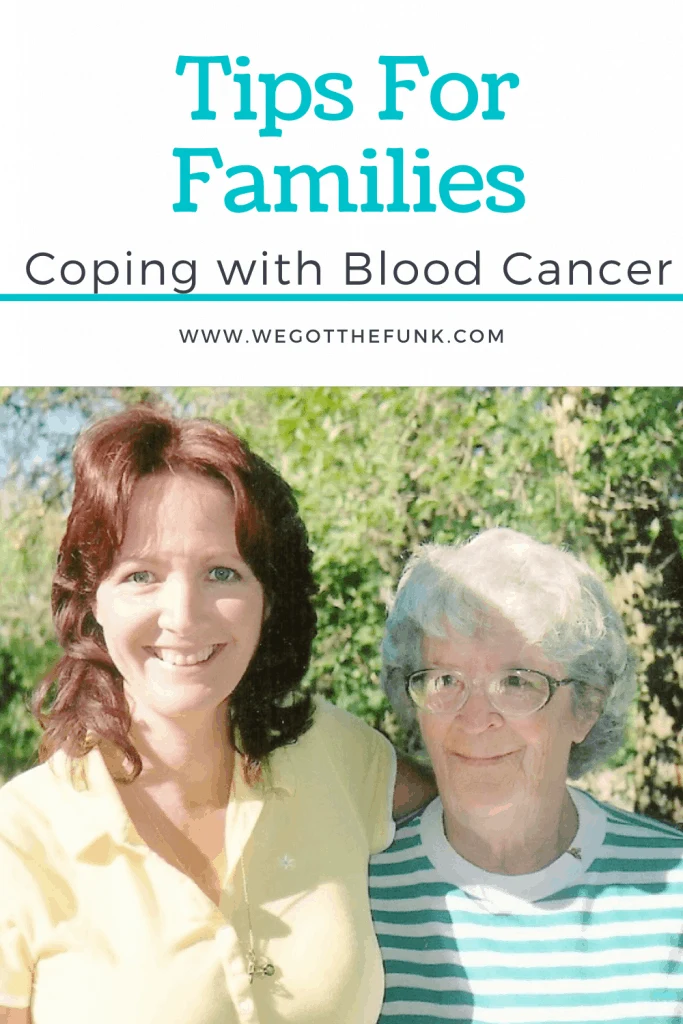Thank you AstraZeneca for sponsoring this post. September is Blood Cancer Awareness Month
My Grandma
6 years ago, I was at lunch with one of my best friends. My mom called and I could tell that she was just incredibly upset and could hardly get the words out. “Grandma is not good, it’s cancer, in her blood.” We quickly wrapped up lunch and I rushed to be with my mom and grandma.

My grandma has been a huge constant in my life since birth. We took her on nearly every family vacation with us, she watched us when my parents would work or go on vacation, she took care of me when I was severely burned as a child. She was a HUGE part of my life and this was a shocking diagnosis for us to all take in, as she was perfectly healthy from all other accounts.
Cancer In the Blood
Up until that day, we had ZERO family history of cancer. My grandmother had a dairy allergy but was otherwise perfectly healthy, took no medications for any sort of health condition, and was one of the toughest women I have ever known. When we were given the full diagnosis of Mantle Cell Lymphoma we knew we were in for a challenge.

It was going to be a tough battle to win, especially because she was at stage 4 when it was caught. In the end, grandma did lose her battle with MCL, but not without a fight.
Blood Cancer Awareness Month
I am sharing our story because I feel like it is important for others who are or have experienced a blood cancer diagnosis to have a safe place to take, share and find resources. As September is National Blood Cancer Awareness Month, I wanted to share a resource that could help someone who is a caregiver, a friend, a daughter or granddaughter, or even a patient diagnosed with a form of blood cancer.

Prescription CALQUENCE®(acalabrutinib) is an oral treatment for adults with chronic lymphocytic leukemia (CLL), small lymphocytic lymphoma (SLL), or previously treated mantle cell lymphoma. CALQUENCE may cause serious side effects including: serious infections, bleeding problems, decrease in blood cell count, new cancers, and heart rhythm problems. Some may lead to death. Tell your doctor if you experience unexpected infections such as flu-like symptoms; bleeding such as blood in your stool or urine; or heart rhythm problems such as fast or irregular heartbeat. Use sun protection when outside in sunlight. View Prescribing Information including Patient Information here.
CALQUENCE is a prescription medicine used to treat adult patients with chronic lymphocytic leukemia (CLL)/small lymphocytic lymphoma (SLL) and adults with mantle cell lymphoma (MCL) who have received at least one prior treatment for their cancer. My grandmother was active and a big part of my everyday life and did not like being in a hospital and she would have loved the convenience of CALQUENCE. Taking your MCL medication should be as convenient as an oral, twice-a-day capsule, allowing you to focus on the lifestyle you want. CALQUENCE also has a great support system for their patients, check it out below.
Feel supported all day, all night on CALQUENCE
- CALQUENCE™Cares
- Patient support material
- Caregiver support material
- AstraZeneca 360 and Patient Savings Program
Tips For Family Coping with Blood Cancer
One of the hardest parts of my grandmother’s diagnosis was helping my own mother through the diagnosis. My mom was very close to her mother and this was a huge blow to our lives. Like I had mentioned, prior to the diagnosis, my grandma was completely healthy, so this was out of left field.

I found that doing a few simple things really helped both my grandmother and my mother cope with the diagnosis. If you or someone you know is facing this, please share these tips for families coping with blood cancer. If you’re a caregiver or know someone that is, please share this post!
- Listen: I found that just being there and listening to both my mother and grandmother process the diagnosis was the best thing I could do. Often they did not want a response, they just wanted to be heard and I know that helped both of them.
- Support: Be there for them. Offer your help, your ear, your love, and be there. Ask them what they need and follow through. A strong support system through a cancer diagnosis is critical to healing.
- Educate: As a biologist and a teacher, I think one of the most important things you can do as a support person is to be educated. You do not necessarily need to share that information with everyone, but knowing what the terminology the docs are using and the impacts of the diagnosis can be a huge asset to helping those going through blood cancer.
- Advocate: I remember my mom and grandma being in such shock that they were almost paralyzed. I had to be the advocate at times, making sure that the nurses and doctors were answering the questions and concerns we had and writing down everything so we could process later. My mom told me that she was thankful to have my sister and I to help with this.
- Live: Life with a cancer diagnosis does not necessarily mean death. We needed to just live our lives as normal as possible and help make our grandma comfortable with as much normalcy to her routines as we could. Keeping routines, doing things that we all enjoyed and just being with each other was very important for all.



